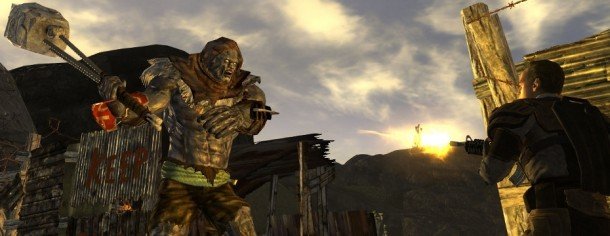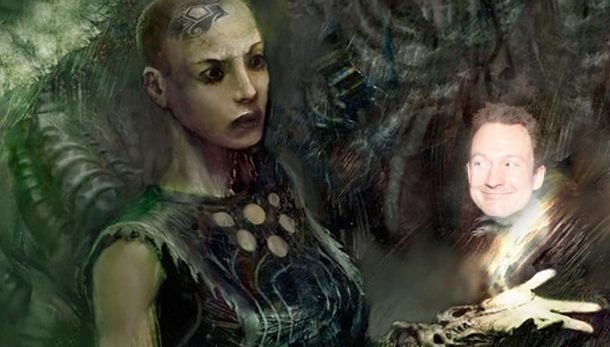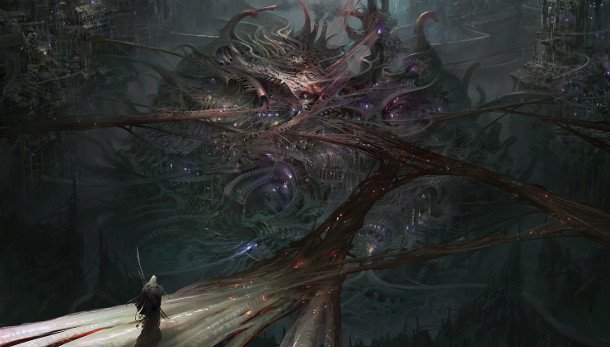
PC Gamer: As a studio that's in the vanguard of telling stories with games, which is something that really hasn't fully come into its own the way literature or even film has, where do you guys see yourselves as having made the most progress as storytellers, and where would you like to see the medium go from here?
CA: Well, the first thing I think we're really conscious of is the fact that we try to pay a lot of attention to the actual game systems before we start a story. Like, when we were doing Fallout: New Vegas, we had some pillars for the project. But one in particular was, we knew that one of the new systems we wanted to add was the reputation system. So, once you have that as one of your pillars for the new gameplay experience, you want to make sure that you weave a story that takes advantage of those mechanics.
And that may sound obvious, but I don't know if every game necessarily focuses on that when they're doing stories. I feel like, sometimes, people take the route of making the story much more independent, rather than anything that's actually going on with the second-to-second gameplay. So, for example, the reputation system. Okay, that means we've got the following things the story needs to incorporate. Like, there have to be multiple factions. There have to be consequences, and sort of ego-stroking reactivity that occurs based on what your reputation level is with them, either negative or positive. It doesn't necessarily have to be punishing to the player, but they should feel like they're making a difference in the world.
Also, if the game you're constructing is an open-world game, like with New Vegas, we tried to make sure that we were also constructing an open-world story. Which may sound kinda weird. We'll have have characters with agendas, we'll have factions. But ultimately, we're designing this story so that the player wants to go in and mess it up however they want, they'll still have an entertaining experience, and they'll still be able to complete the game. But they feel like they have more room to breathe than in, say, a linear storyline.
And then, the second part of that—where would you like to see game storytelling go? Where do you think the boundaries are that you'd like to push with telling stories in games?
I think there are two things. One is, I'd like to see more reliance on system mechanics to allow the player to tell their own story. Some of the most entertaining New Vegas experiences we had were from people who found interesting ways to create events in the game itself. They weren't necessarily narratively scripted. They didn't necessarily have any dialogue or writing associated with them. It was just stuff they could do to the environment by pushing the systems around and getting entertaining events that way.
Also, I'd like to see much more of a focus on visual storytelling. I think that, sometimes, writers can lose sight of the fact that audio, level design, graffiti, graphics, posters... can all be used to flesh out a location without a single line of dialogue, and still tell a compelling story about what happened, what your goals for the area are, and what the theme of the adventure is. I'd like to see much more attention to that, as opposed to, there are two heads talking to each-other, and you see text on the screen with a menu.
The biggest gaming news, reviews and hardware deals
Keep up to date with the most important stories and the best deals, as picked by the PC Gamer team.

Let's talk Numenera really quick. If you are brought on to the project [with the $3.5 million stretch goal], what would your role be?
It's two-fold. One part is, I will be reviewing all of the design documentation that the project develops. Kevin Saunders is the project lead, Colin McComb is the lead designer. And what I would do is review all of their documentation, offer feedback, give whatever critiques, if there are any, both positive and negative. And then I'll just reinforce, you know, "Hey, here are some of the goals we were going for in the original [Planescape] Torment, here are some positive things you guys are doing that I think are hitting the mark, and here are some other things that you might want to consider incorporating."
The other thing that I would be doing, is that I should have a chance to write the eighth companion for the game. And that would be a lot like what I did for previous Obsidian titles, and Black Isle, in the sense that... when we did Mask of the Betrayer at Obsidian, I wrote Gann and Kaelyn the Dove. And I think Kevin and George really liked what I did with those two characters. So I would be doing one additional character, much like that, for Numenera.
Do you have a rough idea of what kind of character you would like to add to that world?
You know, as I was taking the plane ride over here, I actually pulled out my sketchbook... and I started writing down all of the possible directions I could take the character. What I really like is that, already, the locations they're coming up with for Numenera are sparking my imagination. For example, George Ziets had his update on that one area, the Bloom. And I got so excited to hear the little details. Like, if anyone attempts to quantify the Bloom, it devours and destroys them. And the idea that, whatever you feed it, it opens up new dimensions... when I hear that stuff, I just get really excited.
How early were you talking with the guys at inXile about doing a new Torment game? I know a lot of people in the community were asking after those first few blog posts from Brian Fargo about bringing the name back, like, "Where's Chris Avellone?"
The time frame was... not long after Brian realized that he could get the name, and he actually purchased the name for Torment, then he talked to me about it, and whether or not I would be interested in working on the project. But at the time, between Wasteland 2 and Eternity, there wasn't any time for me to do that. And occasionally, Brian would follow up with me and see what my situation was, and if things might work out.
Then Wasteland 2 finished up, and my time freed up a great deal more. Then Brian and Kevin started talking to me and Feargus [Urquhart, Obsidian CEO], not necessarily about my time, but just about ways we could work together. And I think that between Kevin and Brian, they were able to break out a reasonable schedule for me to work on the project with Feargus. And Feargus was pretty comfortable with that. So he was like, "Hey, if you really do want to work on this.." And I did! But that didn't happen until a few days before the stretch goal announcement. Before that, I thought there would be no chance I'd be able to do it.
So, this is something that I can't help but wonder about: With the shared heritage you guys at Obsidian and the guys over at inXile have, and how often and openly you collaborate, what's stopping you from just coming together to form the Ultimate RPG Studio of Ultimate Destiny?
I don't really know. I think that inXile and Obsidian just like casually dating right now. [laughs] We don't want to quantify our relationship, and mess it up with a boyfriend/girlfriend thing.
I think, right now, Brian, Feargus, and just Obsidian and inXile... we just enjoy working together, sharing information on how to make both of our Kickstarters better, sharing products across Kickstarter, and also sharing technology. We've learned about Unity together. And so far, it's a really comfortable relationship. If things get better in the future, that's great. But right now, things are pretty great as they stand. I certainly like working with Brian, and I like working with Feargus.
This whole Kickstarter process has sort of allowed our organizations to talk more than we could otherwise. That's another reason I like Kickstarter!

I'm actually interviewing Brian later today. What could I say to him that would totally freak him out coming from someone he's never met before.
Oh... tell him, "The clowns are coming for you, Brian. They've made peace with Avellone."
Alright, I'll do that. Anything else you'd like our readers to know before we wrap it up here?
Well, considering it's PC Gamer, one thing I did want to say was, one obstacle to getting some of our products funded was because no publisher would listen to having a PC-focused or PC-only title. Basically, not having consoles involved with the process. And, obviously, that would have been a huge, additional cost for us. The fact that we can do a PC-focused product... we can use the keyboard controls, we can use the mouse. That is very liberating for us as game designers.
Thanks again to Chris for talking to us. As of the writing of this article, there are about six days left and $300,000 to go for Chris to be involved in Torment: Tides of Numenera . You can keep up with the development of Project Eternity on Obsidian's official site .
Len Hafer is a freelancer and lifelong PC gamer with a specialty in strategy, RPGs, horror, and survival games. A chance encounter with Warcraft 2: Tides of Darkness changed her life forever. Today, her favorites include the grand strategy games from Paradox Interactive like Crusader Kings and Europa Universalis, and thought-provoking, story-rich RPGs like Persona 5 and Disco Elysium. She also loves history, hiking in the mountains of Colorado, and heavy metal music.

